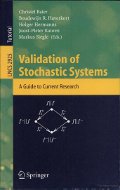|
[Nor04]
G. Norman.
Analysing Randomized Distributed Algorithms.
In C. Baier, B. Haverkort, H. Hermanns, J-P. Katoen, M. Siegle and F. Vaandrager (editors), Validation of Stochastic Systems: A Guide to Current Research, volume 2925 of Lecture Notes in Computer Science, pages 384--418, Springer.
October 2004.
[ps.gz]
[pdf]
[bib]
|
|
Notes:
The original publication is available at link.springer.com.
|
 Abstract.
Randomization is of paramount importance in practical
applications and randomized algorithms are used widely, for example in
co-ordinating distributed
computer networks, message routing and cache management.
The appeal of randomized algorithms is their simplicity and elegance.
However, this comes at a cost: the analysis of such systems become very complex,
particularly in the context of distributed computation.
This arises through the interplay between probability and nondeterminism.
To prove a randomized distributed algorithm correct one usually involves
two levels: classical, assertion-based reasoning, and a
probabilistic analysis based on a suitable probability space
on computations.
In this paper we describe a number of approaches which allows us
to verify the correctness
of randomized distributed algorithms.
Abstract.
Randomization is of paramount importance in practical
applications and randomized algorithms are used widely, for example in
co-ordinating distributed
computer networks, message routing and cache management.
The appeal of randomized algorithms is their simplicity and elegance.
However, this comes at a cost: the analysis of such systems become very complex,
particularly in the context of distributed computation.
This arises through the interplay between probability and nondeterminism.
To prove a randomized distributed algorithm correct one usually involves
two levels: classical, assertion-based reasoning, and a
probabilistic analysis based on a suitable probability space
on computations.
In this paper we describe a number of approaches which allows us
to verify the correctness
of randomized distributed algorithms.
|